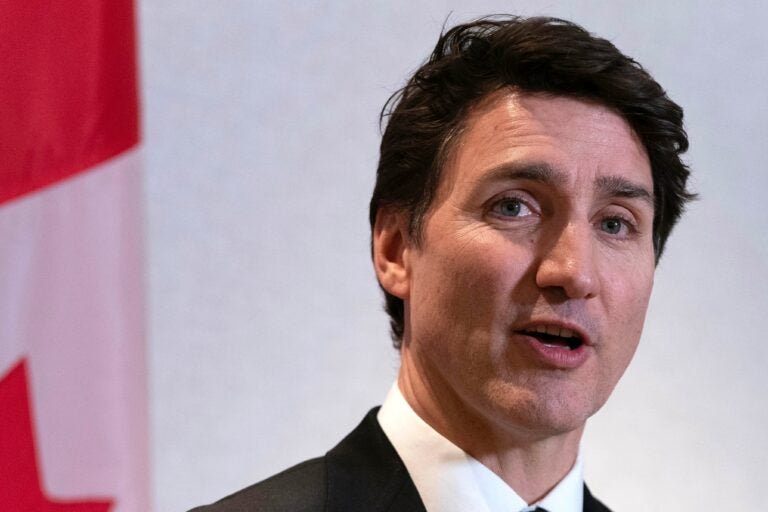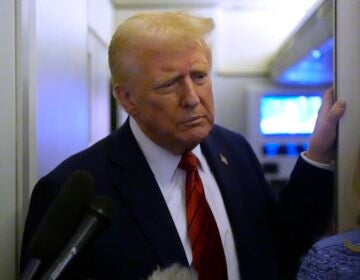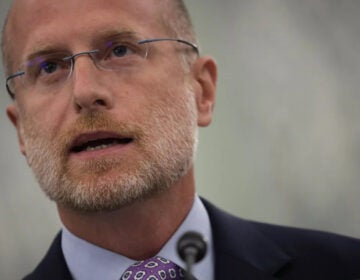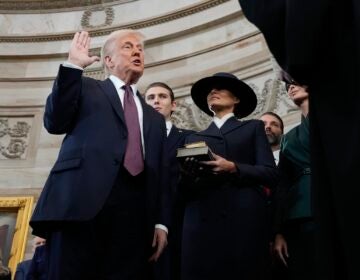Trump imposes new tariffs on imports from Mexico, Canada and China in new phase of trade war
The import taxes could result in higher prices for a wide range of products. The targeted countries have said they will respond with retaliatory tariffs on U.S. exports.

File - Canada's Prime Minister Justin Trudeau speaks to the media after a meeting with Jay Timmons, president and CEO of The National Association of Manufacturers, in Washington, Thursday, Jan. 9, 2025. (AP Photo/Jose Luis Magana)
A new global trade war has begun.
President Trump signed executive orders Saturday, imposing 25% taxes on most imports from two of the country’s biggest trading partners: Canada and Mexico. Goods from China will be charged a 10% tax.
The tariffs take effect on Tuesday.
Trump said in a social media post he’s taking the action in an effort to address the illegal flow of drugs and immigrants across the United States’ northern and southern borders.
In another post Sunday morning, Trump said the tariffs were also meant to address the trade deficits that the U.S. has with a number of foreign countries.
“THIS WILL BE THE GOLDEN AGE OF AMERICA! WILL THERE BE SOME PAIN? YES, MAYBE (AND MAYBE NOT!),” Trump wrote. “BUT WE WILL MAKE AMERICA GREAT AGAIN, AND IT WILL ALL BE WORTH THE PRICE THAT MUST BE PAID.”
Canadian crude oil will be subject to a lower, 10% tariff, which could mitigate the effect on U.S. gasoline prices. Midwestern oil refineries are heavily dependent on Canadian crude.
The import taxes could result in higher prices for a wide range of products, including fruits and vegetables, flat screen TVs, and auto parts. The targeted countries have said they will respond with retaliatory tariffs of their own on U.S. exports.
Business groups started to react immediately after the announcement. A trade group representing the liquor industry said the tariffs would hurt jobs.
“Since the 1990s, trade in spirits in North America has been largely tariff-free, resulting in significant growth. U.S.-Canada trade in spirits increased by 147%, while U.S.-Mexico trade surged by 4,080%,” according to a joint statement by the Distilled Spirits Council of the U.S., the Chamber of the Tequila Industry, and Spirits Canada.
The group said that the products are distinctive to each country and the tariffs would hurt the domestic industries. Bourbon and Tennessee Whiskey can only be made in the U.S., Tequila in Mexico, and Canadian Whisky in Canada.
The American Fuel & Petrochemical Manufacturers, an industry trade group, warned in a statement on Saturday that a higher cost to import crude oil from Canada and Mexico — as well as other Canadian energy products — could mean that American consumers will end up paying more for energy.
“We are hopeful a resolution can be quickly reached with our North American neighbors so that crude oil, refined products and petrochemicals are removed from the tariff schedule before consumers feel the impact,” AFPM president and CEO Chet Thompson said.
China, Canada and Mexico respond
On Sunday, in coordinated statements from China’s foreign ministry and commerce ministry, Beijing denounced the tariffs and said China would take unspecified “corresponding countermeasures.” The commerce ministry said the tariffs were a serious violation of World Trade Organization rules, and said it would launch a legal challenge at the WTO. The foreign ministry said China has taken steps to help the U.S. deal with fentanyl, which it said was ultimately a U.S. problem, and said the imposition of tariffs “will inevitably affect and undermine future cooperation between the two sides on anti-drug issues.”
Canadian Prime Minister Justin Trudeau, in a public appearance on Saturday, lamented the impending U.S. tariffs on Canadian goods and warned American consumers that they would see prices rise.
“This is a choice that, yes, will harm Canadians, but beyond that it will have real consequences for you, the American people,” Trudeau said.
“If President Trump wants to usher in a new golden age for the United States, the better path is to partner with Canada — not to punish us,” he added.
Canada’s government announced that it would impose 25% retaliatory tariffs on a variety of U.S. products, starting with appliances, clothing, wine and spirits, orange juice, peanut butter and motorcycles.
Canadian tariffs on $30 billion in goods imported from the U.S. are set to take effect on Tuesday, while tariffs on another $125 billion-worth of goods will be imposed later. Officials said that “additional measures, including non-tariff options,” would remain on the table as long as the U.S. continued to impose new import costs on its northern neighbor.
Trudeau said that although fewer than 1% of illegal border crossings and less than 1% of fentanyl into the U.S. come from Canada, the country had launched a $1.3 billion effort to further secure its shared border with the U.S. in December.
Mexican president Claudia Sheinbaum said on Saturday that she had directed her Secretary of the Economy to implement a plan that includes tariffs and non-tariff measures, but did not share additional details.
In a post on X, Sheinbaum said the Mexican government had seized 40 tons of drugs in the past four months and also blamed U.S. gun sellers for arming Mexican drug cartels.
Sheinbaum proposed that Mexico and the U.S. instead form a working group rather than impose retaliatory economic measures on each other. “Mexico does not want confrontation,” she said.
How American shoppers and companies are preparing
Businesses and shoppers in the U.S. had already started making contingency plans. Trade data released earlier this week showed a sharp rise in imports in December, suggesting some companies tried to stockpile goods before any tariffs take effect.
Some individual shoppers also tried to beat the tariffs. Personal spending on durable goods such as autos and televisions jumped in December, according to figures released Friday by the Commerce Department. Mexico is a leading producer of flat-screen TVs.
Tariffs have come up more than 200 times on corporate earnings calls this month.
The auto industry is expected to be particularly hard hit because it is highly integrated, relying on manufacturing in all three countries.
General Motors told financial analysts on Tuesday that it could shift some pickup truck production out of Mexico and Canada if tariffs are imposed. But the automaker is reluctant to act while the trade landscape is still uncertain.
“We are prepared to mitigate near-term impacts,” said CEO Mary Barra. “What we won’t do is spend [a] large amount of capital without clarity.”
John Ruwitch contributed to this report from Beijing.
WHYY is your source for fact-based, in-depth journalism and information. As a nonprofit organization, we rely on financial support from readers like you. Please give today.




